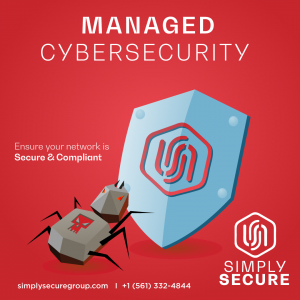Regular Antivirus software detects, stops, and treats viruses and worms, but antivirus alone is not enough for SMBs with business-critical data. Targeted cyberattacks are on the rise, and this means your approach to protecting your data should also evolve.
Regular antivirus software may be sufficient for individual devices if they don’t store private data. SMBs who do have these assets, which make them targets to more advanced attacks, require a more proactive approach.
A study by Panda Research has found that a typical antivirus will only stop 30-50% of new malware when it first appears. Antivirus protects you from classic dangers like known viruses, but with sophisticated attacks on the rise, SMBs require a multi-layered approach to cybersecurity. A trusted managed services provider like Simply Secure, can ensure that your business-critical data is protected proactively against the evolving threat landscape.
Data from the National Cyber Security Alliance shows that 60 percent of SMBs close after six months following a cyber attack. Companies may be subject to an extreme loss in revenue from the time taken to fix a data breach or fall victim to ransomware demands. Additionally, when your company falls prey to a cyberattack, you may lose credibility and customers’ trust, risking potential new clients or repeat business.
There are many services offered by managed cybersecurity professionals, which benefit SMBs in addition to antivirus software.
1. Customized protection from cyberattacks:
Cybersecurity companies protect their clients from cyberattacks before they occur. Unlike antivirus, which is predominantly reactive, managed cybersecurity is proactive. Also, security solutions are customized to fit a company’s unique infrastructure and budget, unlike general antivirus software. The products are more efficient in detecting and remediating potential threats by actively monitoring and updating defenses.
2. Proactively identify weaknesses in your network’s infrastructure:
Companies are often unaware that their computer networks harbor security vulnerabilities that allow attackers to enter. Cybersecurity companies have the tools and knowledge to provide a thorough audit of every piece of hardware used to identify these gateways. They then create a plan to fix security holes and strengthen network weaknesses. Services like a regular Vulnerability Assessment will proactively protect your network against cyberattacks before they occur.
3. People Power:
Untrained employees can be the most significant vulnerability to a company’s online security. According to Verizon’s 2019 data breach investigations report, 33% of breaches are due to social engineering. Companies must train their employees on how to identify phishing and business compromised emails. Cybersecurity teams provide helpful tools and resources to teach correct cybersecurity habits.
4. Adapt to the changing threat landscape:
Also known as a ‘bug fix,’ a patch is a set of changes to a computer program or its supported data, which will update, fix and improve its performance or security. When a cybersecurity company initializes its services for a business, they apply patches to hardware and software in the organization. They will perform routine patch-management and ensure they are up-to-date to protect your networks from malware and other security vulnerabilities.
5. 24/7 Detection and Remediation:
By providing 24/7 monitoring through a security operations center (SOC), threats are identified in real time. For smaller businesses, an outsourced SOC enables immediate access to talented, certified cyber professionals around the clock, shared threat intelligence, segregation of duties, scalability and reduced barriers to entry and lower ongoing costs. Cybersecurity professionals use security information event management (SIEM) tools to identify and remediate issues as they arise. A remediation plan saves businesses an exponential amount of time and potentially loss of revenue and irreparable damage to reputation.
6. Compliance:
Data breaches have become a mainstream topic; therefore many governments have applied laws for corporations to protect their clients’ data. It is the responsibility of the company to keep their systems safe from potential attacks. Failure to meet these governmental requirements can result in hefty fines or lawsuits large enough to put smaller companies out of business. By trusting a cybersecurity company to handle your networks, you are guaranteed to meet these requirements specific to your country and industry.
 Antivirus forms part of a cyber security framework however will not be able to protect your system against all threats. For enhanced security, your business needs a multi-layered, proactive approach.
Antivirus forms part of a cyber security framework however will not be able to protect your system against all threats. For enhanced security, your business needs a multi-layered, proactive approach.
Talk to the experts at Simply Secure Group about your businesses’ specific cybersecurity needs to protect your systems before a crisis occurs. It only takes one virus to cost your company exponential damage in lost revenue, clients, and future business
